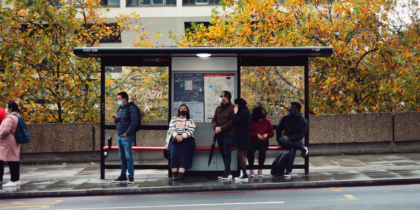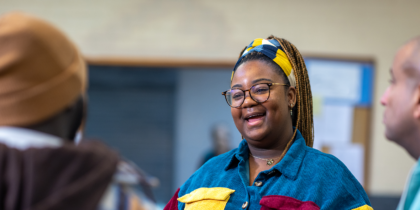South Tyneside has a population of approximately 150,000 and is in the North East of England. The population is recorded as being mainly, though not exclusively, white.
It is one of the 20% most deprived local authorities in England. Many health indicators are worse locally than the national averages. These include life expectancy for men and women, hospital admissions for alcohol-related harm, premature mortality from cancer, excess weight in adults, and smoking prevalence.
The local suicide rate is slightly below the national average, but the rate of hospital admissions for intentional self-harm is much higher (298.8 admissions per 100,000 South Tyneside residents, compared with 181.2 admissions per 100,000 nationally). Common mental health problems are estimated at 19.1% of the local adult population compared with 16.9% of the national population.
The Public Health team takes a partnership approach to addressing population health need and has worked steadily to build a programme of public mental health activity. The approach they take is ‘collegiate, not adversarial’ and they have worked hard to build trusting relationships with voluntary sector organisations.
For a full description of local needs and assets: Joint Strategic Needs and Assets Assessment (JSNAA) – South Tyneside Council
Identifying the focus for the Better Mental Health Fund
By focusing on areas of need identified in the JSNA, and by taking a mixed approach of developing services that were already in place with resourcing new approaches, it was hoped that unmet needs will be addressed for the specific groups and communities being targeted.
The public health lead found the early direction from Office for Health Improvement and Disparities (OHID) helpful in determining the focus of the programme, especially as the time they had to produce a satisfactory bid was tight.
Like all the case study sites, South Tyneside has been hit hard by the Covid pandemic. The impacts on the system of the pandemic, and its associated restrictions and protections, were significant.
The additional investment from the Better Mental Health Fund was welcomed and used to extend the scope of existing projects.
Most of the organisations funded through the Better Mental Health Fund in South Tyneside are run by the voluntary and community sector.
How was the Better Mental Health Fund used?
The Better Mental Health Fund is supporting a range of projects across the life course that are targeted at populations facing greater inequalities, both in terms of the circumstances in which they live and the challenges they face in accessing support.
The projects are varied, and include:
- Mental health peer support and peer mentor programmes for young care leavers
- South Tyneside Recovery College – Community Kind Mind
- Debt and financial support
- Tackling loneliness and social isolation in over-65 year olds
- Mental health support service for vulnerable women aged 18-34
- Vulnerable young women’s engagement programme
- Developing community resilience for frontline key workers
- Reducing loneliness in young people – a peer project.
Outreach for people with poor mental health: Community Kind Mind
It is not uncommon for people with poor mental health to be told that they ‘will never work again’. South Tyneside Recovery College supports individuals to achieve better mental health and improved wellbeing. Its overarching purpose is to ‘help people see that there’s hope for the future and they can find a way through’.
Some students at the Recovery College have complex needs, such as a diagnosis of personality disorder, requiring specialist support. Others do not have a formal mental health diagnosis but also wish to improve their day-to-day lives. Interventions are wide ranging and include helping students to understand low mood and depression, to build resilience, manage stress, and regulate emotions.
There is no referral pathway; students can self-refer and define their own needs.
Through the Better Mental Health Fund, the Recovery College has recruited a full-time member of staff to work with people with a history of poor mental health.
She reaches out, builds relationships with individuals, and supports them to access a range of activities, such as one-to-one and group support. For some students, maintaining enthusiasm can be challenging and she offers intensive support for those who need it, keeping them motivated, and ensuring that they are accessing activities that are appropriate and helpful.
The energy and enthusiasm of the postholder, who brings wide-ranging expertise in project management and community engagement, as well as lived experience, have been key elements in the project’s success.
South Tyneside Recovery College is determined to find the means to keep her employed. ‘We can’t imagine how we’d operate without her now’. In the absence of continued funding, they are looking to reprofile their current resources to keep this work going.
See: Kind Mind Community – Wellbeing Info
Support for women with depression: Women’s Health South Tyneside
Women’s Health in South Tyneside (WHiST) is a voluntary sector organisation that connects access to counselling services for women with practical support in relation to budgeting, debt management and bill-paying. The project also offers advice on housing issues and social security benefits.
An advocate, resourced by the Better Mental Health Fund, hosts a drop-in session on a Tuesday. There is group work as well as one to one support on offer. Attendees talk about the challenges they face, offer each other support, and identify solutions. They can also eat together, which might be the only meal they’ll have that day, as well as socialise and interact – creating positive experiences for women who struggle with depression and low mood, as well as isolation and loneliness.
One social worker commented on the support that WHiST had given a client:
‘J has benefitted from various services provided by WHIST, including advocacy and counselling, and I know she is keen to engage in the various courses offered, which is something she was unlikely to have done prior to WHIST’s involvement which demonstrates her increased confidence.
‘[Your member of staff] has supported J on a practical and emotional level. For example, she has supported J with housing and finances, and as a result has ensured that J is now in receipt of her current benefit entitlements which has been key in reducing some of J’s stress levels.’
Attendees are reporting improvements in their general wellbeing and self-esteem and greater willingness to manage their debt.
Impacts
Overall, the projects in South Tyneside reached 3,228 beneficiaries, exceeding their target of 2,859.
Despite almost 94% of the population being white British and Irish, the projects managed to engage people who identify as Indian (0.7% of the population; 1.5% of beneficiaries), Pakistani (0.4% of population; 2.5% of beneficiaries) and Bangladeshi (1.25% of population; 2.1% of beneficiaries), in line with the overarching objectives of the programme to reduce inequalities for diverse communities.
There was also strong reach into neighbourhoods with the highest levels of deprivation and where inequalities are experienced most acutely. People living in the top 10% most deprived places account for 25% of the population overall and 32% of recorded beneficiaries. Importantly, engaging with projects led to discernible improvements in residents’ wellbeing according to standardised measures used for the projects that collected data.
Feedback from funded projects suggests that their interventions have prevented people from falling into even more difficult circumstances and therefore are helping reduce the need for some statutory services.
One participant wrote:
Since coming to WHiST and the Tuesday morning drop in, I still feel anxious about my finances, but I feel like it is getting sorted out now.
I now have more a month to live on and feel I make good choices with money. I’m starting to get more of my confidence back. I have now told my children about my problems with money and how much I have been struggling, they couldn’t believe that I had kept it to myself for so long.
It has made our relationship stronger, and I feel the weight has been lifted.
Projects are asking how to calculate the non-cashable savings they are bringing to the system. A tool to analyse these kinds of impacts would be helpful.
The council is working within existing partnership structures, such as Joint Commissioning Groups, to ‘get the projects on the radar’ and start a conversation about securing funding for the future. However, the likelihood of success is limited because of restricted resources across the statutory sector.
Individual voluntary and community sector organisations are actively exploring options for funding with a broad base of funders.
What have we learnt?
- Projects can be set up quickly if there are existing positive relationships with potential providers, especially where trust and mutual respect have been developed. It is important to note, however, that this takes time.
- Sometimes a small amount of money can make a big difference. The small grants initiative for suicide prevention and self-harm has enabled community groups to act quickly and work with people whose needs are not otherwise addressed.
- It is yet to be seen whether the funding has been sufficient to make a sustained difference at a population level across South Tyneside, taking into consideration the short-term nature of the funding and the challenges that poor families are facing in relation to the cost of living.
- A key element in delivering successful community-based projects is the quality of relationships with local people. However, coproduction takes time and resource – two elements which would be productively borne in mind in the development of Integrated Care Systems.
Local evaluation
The local evaluation, undertaken by Shelina Visram and Mabel Lie from Newcastle University, will capture the community impacts of the Better Mental Health Fund. They are seeking to understand what difference the fund had made to the organisations involved and their beneficiaries, as well as capturing and exploring any wider impacts.
Questions to be answered include:
- How have the Better Mental Health Fund activities been implemented, in terms of learning from any challenges and successes reported by the provider organisations?
- How might these activities and their impacts be sustained into the future?
- What difference have these activities made to local people receiving them?
- Has the Better Mental Health Fund led to any wider impacts on the organisations and their local communities?



